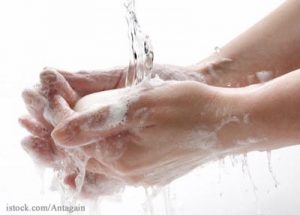A study published in Environmental Science and Technology has found that triclosan, a common ingredient in antibacterial soaps and other consumer products, is creating antibiotic-resistant bacteria in rivers and streams. Triclosan (TCS) is a broad-spectrum antimicrobial compound. It has been found in ecosystems all across the country. This is the first study to find triclosan resistance in the natural environment.
 Triclosan is found in products including clothing, kitchenware, toys, body washes, cosmetics, toothpaste, and antibacterial soap. The FDA has found that triclosan, while not currently known to be hazardous to humans, may alter hormone regulation. FDA states that “FDA has not received evidence that the triclosan provides an extra benefit to health. At this time, the agency does not have evidence that triclosan in antibacterial soaps and body washes provides any benefit over washing with regular soap and water.” The chemical does reduce gingivitis when used in toothpaste.
Triclosan is found in products including clothing, kitchenware, toys, body washes, cosmetics, toothpaste, and antibacterial soap. The FDA has found that triclosan, while not currently known to be hazardous to humans, may alter hormone regulation. FDA states that “FDA has not received evidence that the triclosan provides an extra benefit to health. At this time, the agency does not have evidence that triclosan in antibacterial soaps and body washes provides any benefit over washing with regular soap and water.” The chemical does reduce gingivitis when used in toothpaste.
Scientists conducted field surveys and an artificial stream experiment to assess effects of TCS on bacteria living on lake and stream bottoms. The surveys were conducted at the urban North Shore Channel, suburban West Branch Dupage River, and rural Nippersink Creek.
They found that concentration of TCS in sediment increased with urbanization. The North Shore Channel had the highest levels of TCS. And there was significant correlation between TCS concentration in the sediment and bacteria resistant to that compound. In other words, TCS is affecting native bacterial communities. The researchers found a 6-fold increase in cyanobacterial sequences and a dramatic die-off of algae in the artificial streams contaminated with triclosan. Cyanobacteria produce toxins and are less nutritious for aquatic animals, which could damage the food chain.
The organization Beyond Pesticides has launched a campaign, along with Food & Water Watch, to remove triclosan from the consumer market. Many major manufacturers, including Proctor and Gamble and Colgate Palmolive, are phasing out triclosan. The compound was originally used only in hospital and health care settings when introduced in 1972, but has been used in many products since then.





Triclosan can cause serious health problems for some people. It causes me to become very short of breath, triggers wheezing with burning lungs, throat, nose and eyes. And have really bad migraines with vertigo, nausea and many other severe symptoms. I have to avoid anything that contains Triclosan and Microban, because I get very sick from the fumes. I hate to think what would happen if it touched my skin, or worse yet, got in my mouth. I’ve talked with other people who say that can’t tolerate it, either. It is not safe for many of us, but very hard to avoid.